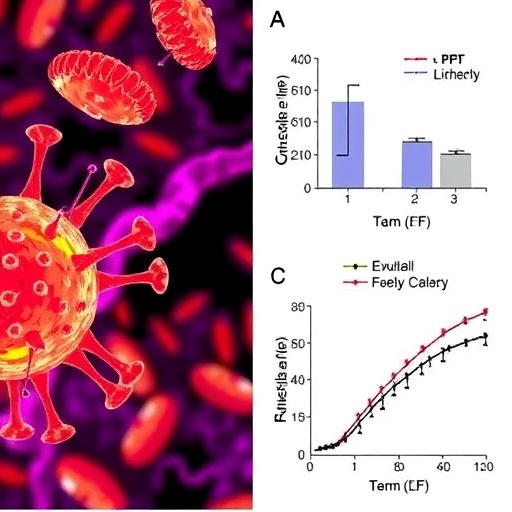In a groundbreaking study published in Nature, researchers have unveiled a novel mechanistic link between protein misfolding and T cell exhaustion, a phenomenon that underpins immune dysfunction in chronic infections and cancer. This research challenges the prevailing understanding by demonstrating that proteotoxic stress, induced by protein aggregation, is not merely a consequence but a driver of the exhausted T cell state.
T cells, crucial soldiers in the adaptive immune response, often succumb to functional impairment during persistent antigenic stimulation. This exhausted state, marked by increased expression of inhibitory receptors such as PD1 and TIM3 and diminished cytokine production, severely undermines the immune system’s ability to eliminate tumors and chronic infections. Yet, the molecular triggers precipitating this exhausted phenotype have remained elusive.
The study employed the proline analogue L-azetidine-2-carboxylic acid (AZC) to induce protein misfolding artificially in mouse effector T cells cultured under conditions typically unfavorable to exhaustion. AZC, by mimicking L-proline but introducing a strained four-membered azetidine ring, disrupts normal protein folding. After 6 days of AZC exposure, confocal microscopy revealed significant intracellular protein aggregation. Strikingly, despite the absence of chronic T cell receptor (TCR) stimulation, these cells adopted the exhausted T cell phenotype, with a remarkable increase in PD1+ TIM3+ populations and a concomitant decline in critical cytokines IFNγ and TNF production.
This elegant set of experiments decouples classical chronic antigen exposure from T cell exhaustion and implicates proteotoxic stress as a causal event. Notably, T cells already in an exhausted state were more susceptible to AZC-induced cytotoxicity, suggesting proteostasis vulnerability may exacerbate immune dysfunction.
Translating these findings in vivo, the researchers treated OT-1 T cells—a model antigen-specific CD8+ T cell population—with AZC prior to adoptive transfer into immunodeficient mice bearing B16-OVA tumors. AZC-pulsed OT-1 cells exhibited a reduced tumor infiltration rate and a shift toward an SLAMF6– TIM3+ phenotype, signifying exhaustion within the tumor microenvironment. This points to a potentially critical role for proteotoxic stress in dampening the anti-tumor immune response in vivo.
Beyond pharmacologic induction, the study explored a genetic approach to trigger protein aggregation by retrovirally transducing effector T cells with a well-characterized misfolding-prone mutant protein, CFTR(ΔF508). This mutant, implicated in cystic fibrosis due to its folding defect and ER retention, accumulated intracellularly in CD8+ T cells, as visualized by confocal microscopy. Expression of CFTR(ΔF508) alone was sufficient to induce key exhaustion markers PD1 and TIM3 in mouse T cells without any chronic antigen stimulation.
Extending their observations to human T cells, the investigators transduced activated human CD8+ T cells with CFTR(ΔF508). Remarkably, they observed a significant rise in CD39 expression, a hallmark of human T cell exhaustion, reinforcing the translational relevance of proteotoxic stress in modulating human immune responses.
These convergent lines of evidence strongly support a model wherein impaired proteostasis drives T cell exhaustion, forming a previously underappreciated axis of immune dysfunction. Protein aggregation within T cells triggers a proteotoxic stress response sufficient to override activation signals and reprogram T cells into an exhausted state.
The implications of these findings are far-reaching. They suggest new therapeutic strategies aimed at restoring protein homeostasis or alleviating proteotoxic stress in T cells could reinvigorate exhausted T cells, enhancing anti-tumor and anti-viral immunity. This paradigm shift opens investigative avenues in immunometabolism and cellular stress responses as critical determinants of T cell fate.
Moreover, this study underscores the importance of considering intrinsic cellular stress pathways alongside extrinsic immune checkpoints when designing interventions to combat immune evasion in cancer and chronic infections. Targeting proteostasis may complement existing immune checkpoint inhibitors and adoptive cell therapies to improve outcomes.
The sophisticated use of AZC and mutant CFTR to recapitulate exhaustion phenotypes without chronic antigen stimulation elegantly delineates causality. This approach disentangles the complex interplay between antigenic stimulation, metabolic stress, and proteostasis in driving T cell dysfunction.
Future research will need to dissect the molecular signaling nodes linking protein aggregation to exhaustion markers, the role of unfolded protein response elements, and whether proteotoxic stress similarly impacts other lymphocyte subsets. Unraveling these pathways could unlock novel biomarkers and therapeutic targets to reverse immune paralysis.
In conclusion, this seminal work by Wang, Ma, Song, and colleagues represents a paradigm shift in our understanding of T cell exhaustion biology. By identifying protein misfolding as a driver rather than a byproduct of T cell dysfunction, it lays a robust foundation for innovative immune modulation strategies poised to transform immunotherapy and chronic disease management.
Subject of Research:
Protein misfolding and its causal role in driving T cell exhaustion independent of chronic TCR stimulation.
Article Title:
Proteotoxic stress response drives T cell exhaustion and immune evasion.
Article References:
Wang, Y., Ma, A., Song, NJ. et al. Proteotoxic stress response drives T cell exhaustion and immune evasion. Nature (2025). https://doi.org/10.1038/s41586-025-09539-1
Image Credits:
AI Generated
Tags: adaptive immune response challengeschronic infections and immune dysfunctioncytokine production and T cell functioninhibitory receptors in T cellsintracellular protein aggregation impactmechanistic links in immunology researchnovel insights into immune evasionprotein misfolding and cancerproteotoxic stress in immune responserole of AZC in T cell studiesT cell exhaustion mechanismsT cell receptor stimulation effects





